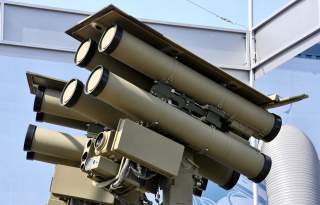Are Russia's Anti-Tank Missiles Impossible to Stop?
Trouble.
If APS won’t protect Western tanks, then it won’t protect Russian ones, either.
The defensive systems protecting Western tanks from anti-tank missiles won’t stop Russian rockets, according to Russian media.
Russian news agency TASS claimed that an Israeli source told it that Israel’s Trophy active defense system, which shoots down anti-tank rockets, won’t work against Russian weapons. The source, identified only as a member of the Israeli defense industry, spoke to TASS at the ISDEF 2019 defense trade show in Tel Aviv.
(This first appeared in June 2019.)
“The Trophy system proved its high effectiveness in repelling single launches of anti-tank missiles and rocket grenades, including launches from different directions,” the source said. “However, the active protection system still can’t sustain fighting two or three anti-tank munitions launched at a minimum interval. This technology is used in Russia’s latest systems, for example, the upgraded Kornet [anti-tank missile] system and single-use grenade launchers.”
Active protection systems, or APS, like Trophy, use radar to detect incoming projectiles, and then knock them down with a barrage of shotgun-like pellets. The question is whether the system can be overwhelmed by multiple projectiles.
“The Kornet-EM is capable of firing two missiles in one beam with a minimum interval while the RPG-30 is furnished with a decoy rocket fired immediately before launching the main rocket,” said TASS.” The Israeli source said that Trophy “active protection system still needs to work on effectively fighting anti-tank weapons based on this principle.”
That TASS made a point of publicizing an Israeli who said Trophy doesn’t work is not coincidental. Israel is the leading maker of active protection systems, with its most prominent product Rafael’s Trophy.
But Russia also has a special interest in demolishing the reputation of Trophy, and the Iron Fist APS by Israel Military Industries, because the U.S. military is buying both systems. Several Army brigades are slated to receive Trophy for their M-1 Abrams tanks, while the Iron Fist is being installed on M-2 Bradley troop carriers. Moreover, Trophy has been tested on Stryker armored vehicles and the Marine Corps is supposed to get Israeli APS, too.
By trashing Trophy, Russia is essentially trashing the centerpiece of the U.S. military’s strategy to protect its expensive armored vehicles from anti-tank weapons. The Pentagon is concerned about the proliferation of anti-tank rockets because such weapons have even appeared in the hands of militias such as Hezbollah, which used missiles like the Kornet to batter Israeli armor in the 2006 Lebanon War. U.S. planners have to assume that these weapons will be a feature in conflicts with even technologically unsophisticated opponents.
Cynics might be forgiven for pointing out that while trashing Western active protection systems, Russia is incorporating APS into its new T-14 Armata tank. The Afghanit system uses radar and optical sensors to detect incoming missiles and knock them down with small fragmentation rounds. Russia has even claimed that the system can destroy ultra-hard, depleted-uranium anti-tank shells.
If APS won’t protect Western tanks, then it won’t protect Russian ones, either.
Either way, active protection systems are not a panacea. The fact is that any defense system can be overwhelmed: fire enough ICBMs or anti-tank missiles, and the defenses will be saturated. The same issue applied to explosive reactive armor, which detonated charges to deflect anti-tank rockets: missile makers responded with tandem warheads on their weapons, in which the first absorbs defensive fire while the second hits the target.
Still, while APS doesn’t make an armored vehicle invulnerable, it does offer the chance of shooting down missiles before they strike the vehicles. How well APS can cope with multiple-missile salvos will probably depend on factors such as prioritizing threats, and carrying a greater number of defensive rounds.
Michael Peck is a contributing writer for the National Interest. He can be found on Twitter and Facebook.
Image: Wikimedia

